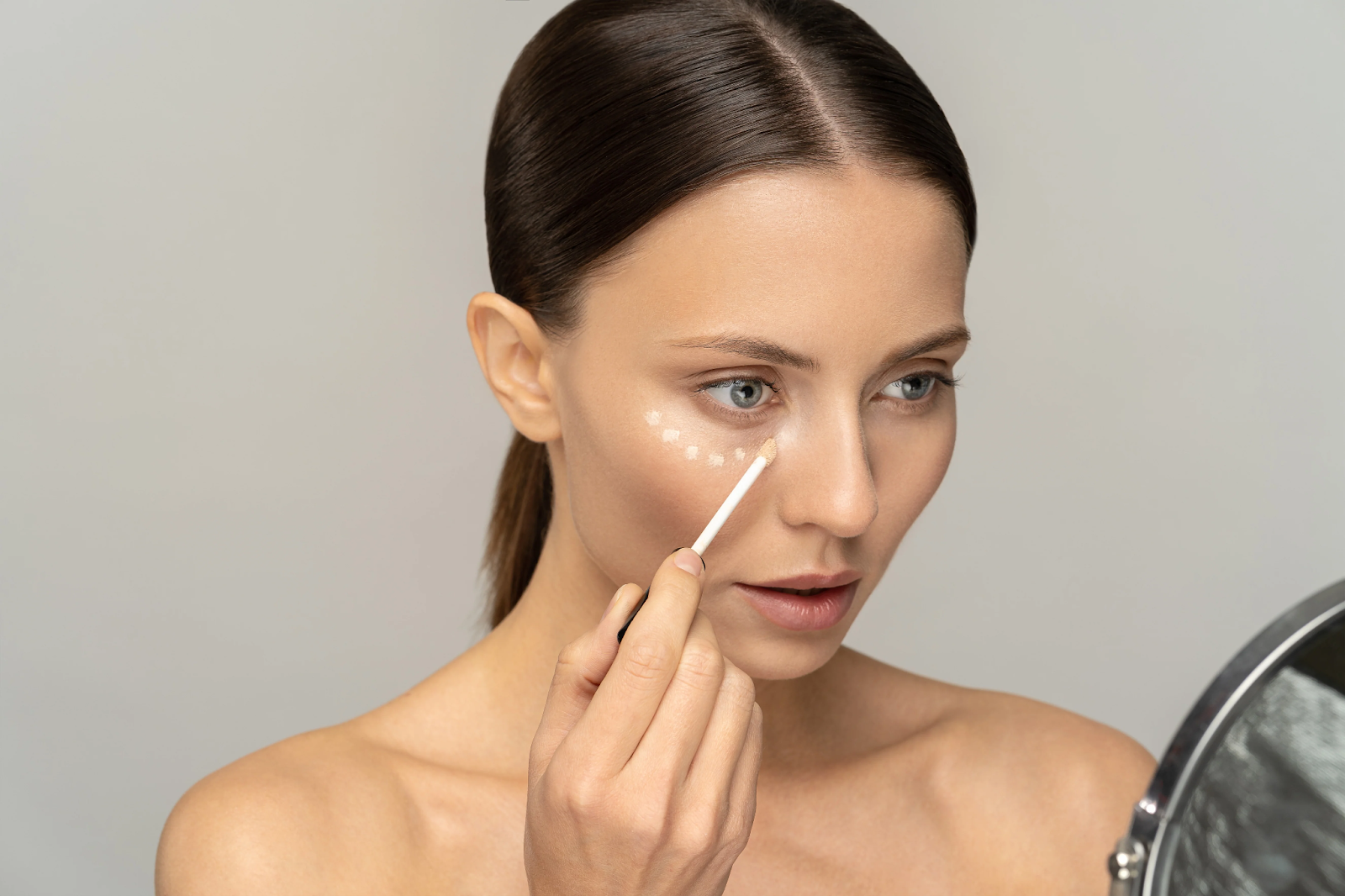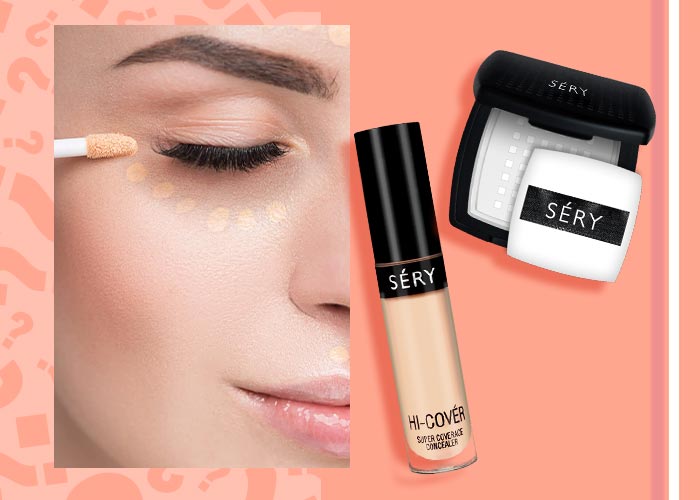Whether to apply concealer or foundation first is a common question among makeup enthusiasts. Concealer and foundation are both essential makeup products that help conceal imperfections on the skin and create a smooth base. However, they serve different purposes and are applied in different ways. Concealer is used to cover small imperfections such as dark circles under the eyes, blemishes, or discoloration. Foundation is applied to even out the skin tone and create a smooth base. So, should you apply concealer or foundation first? Let’s find the answer to this question together, shall we?

What Is Foundation?
A beauty product serves as a solid base for your makeup routine. Traditionally, foundation came in liquid or powder forms, but it has adapted to the dynamic trends in the beauty industry. Today, foundation is available in cream, stick, gel, spray, or foam variations, offering options for a matte, tinted, or dewy base. Moreover, there is a wide array of foundation formulas, diverse finishes, and an extensive range of color palettes, allowing makeup enthusiasts to select a foundation that aligns with their individual preferences.
What is Concealer?
Concealer, true to its name, is yet another makeup product designed for a specific purpose. Its role in a makeup routine closely resembles that of foundation, as both are utilized to conceal facial imperfections. Nevertheless, concealer stands apart due to its primary objective of providing complete coverage for flaws. Imagine concealer as the younger sibling to foundation (and we mean this quite literally). Typically available in smaller quantities, equipped with a precise applicator wand, and featuring a thicker consistency, concealer is crafted for targeted coverage in specific areas.
The Case for Applying Foundation Before Concealer

Sometimes there are no strict rules in makeup application, but when it comes to foundation and concealer, you’ll want to follow a specific order to achieve the smoothest makeup base for your face. If you apply concealer before foundation, it might make the foundation difficult to blend evenly and cover imperfections effectively. If your goal is to achieve even coverage for a smooth base, then applying foundation before concealer is recommended. The main advantage of applying foundation first is that you usually need less foundation to even out the skin tone. Additionally, many foundations have a thinner formula compared to concealers. If you apply a thick layer of concealer under a thin layer of foundation, it may lead to patchiness when you start blending.
The Case for Applying Concealer Before Foundation

Like many rules in makeup, there are exceptions. One significant exception when it comes to the order of applying foundation and concealer is the case of color-correcting concealers. A trending makeup technique is the use of makeup priming, an application process that can optimize the outcome of your makeup. In makeup priming, you begin by applying color-correcting concealer to adjust tones, followed by contouring and blush before applying foundation. This helps create a smoother makeup layer and prevents unwanted shine. However, there are other scenarios when you might prefer applying concealer first, such as when focusing on covering dark circles under the eyes. Flexibility in this order allows you to optimize your makeup technique for perfect results in every situation.
What is the difference between concealer and foundation?
Purpose
Concealer helps cover specific skin imperfections such as dark circles, blemishes, freckles, scars, etc. It enhances the overall appearance of the skin, making it look smoother and more natural.
The foundation aims to even out the skin tone, providing a smooth and natural appearance. While it can cover minor imperfections, it is not as effective as a concealer in this regard.
Coverage
Concealer offers higher coverage than foundation. It can completely conceal imperfections on the skin, whereas foundation can only cover some of them.
Texture
Concealer typically has a thicker texture than foundation, providing better coverage for skin imperfections.
Application
Concealer is usually applied to specific areas that require coverage, such as under the eyes or areas with blemishes.
The foundation is applied to the entire face, contributing to an overall even skin tone.
Additionally, let’s add some more differences between concealer and foundation:
Ingredients
Concealers often contain ingredients that aid in concealing imperfections, such as titanium dioxide, zinc oxide, etc. Foundations typically contain ingredients that contribute to an even skin tone, like silicone, mica, etc.
Cost
Concealers tend to be more expensive than foundations.
Longevity
Concealers generally have lower longevity compared to foundations. Concealer may wear off more quickly than foundation.
I hope these additional insights help you understand the distinctions between concealer and foundation better.
How to choose the right foundation
Choosing the right foundation involves considering key factors like skin tone, coverage, texture, and additional features. Your skin tone, determined by wrist veins—blue for cool, greenish for warm, and red for neutral—is crucial for a natural look. Choose a foundation that complements your skin tone. Coverage ranges from sheer to full, addressing different needs. High-coverage conceals imperfections, while light suits delicate skin. Consider your skin type for texture—liquid/cream for dry, powder for oily. Modern foundations offer functions like sun protection, oil control, and moisturizing. Choose based on preferences—sun protection and oil control for longevity, or moisturizing for a natural finish. Understanding your skin’s unique characteristics is key to enhancing your natural beauty.
How to choose the right concealer
When selecting a concealer, paying attention to factors such as skin type, skin tone, and the nature of imperfections is just as crucial as it is when choosing foundation. Furthermore, for optimal effectiveness, careful consideration of the specific imperfections you wish to conceal is necessary. For instance, if you aim to cover hyperpigmentation or stubborn dark spots on the forehead, opting for a concealer with higher pigmentation and excellent adherence would be a suitable choice. In the case of wanting to blur tiredness-induced dark circles around the eyes, a concealer with a dense texture and strong adherence on the delicate skin around the eyes will yield optimal results.
Conclusion
As mentioned , the decision to apply concealer before or after foundation depends on specific makeup goals and the type of imperfections you want to conceal. If your focus is on concealing areas with significant imperfections like scars, dark spots, or acne, applying concealer before foundation can help create a uniform and high-coverage makeup layer. On the other hand, if the primary goal is to achieve a natural and even foundation coverage across the entire face, applying foundation first and then using concealer is a reasonable choice. I hope that after reading this article, you’ll be able to choose a method that suits your individual preferences and needs.
FAQs
- How long do you have to wait between concealer and foundation?
Wait 5 minutes for your concealer to set before blending it with the rest of your makeup. This helps achieve smooth, even coverage.
- Can I use concealer without foundation?
Yes, you can use concealer without foundation. Concealer can be applied on its own to target specific areas or imperfections without the need for a full face of foundation. This is a common practice for those who prefer a more natural look or want to address specific blemishes without the additional coverage of foundation.
- Do you put concealer all over your face?
No, concealer is typically not applied all over the face. It is usually targeted to specific areas with imperfections, such as under-eye circles, blemishes, or redness, to provide extra coverage where needed. Applying concealer strategically helps to create a more even and flawless complexion without the need for full-face coverage.
- Is it good to apply concealer everyday?
Yes, it is generally fine to apply concealer every day as long as it is done in moderation and with proper skin care practices.






